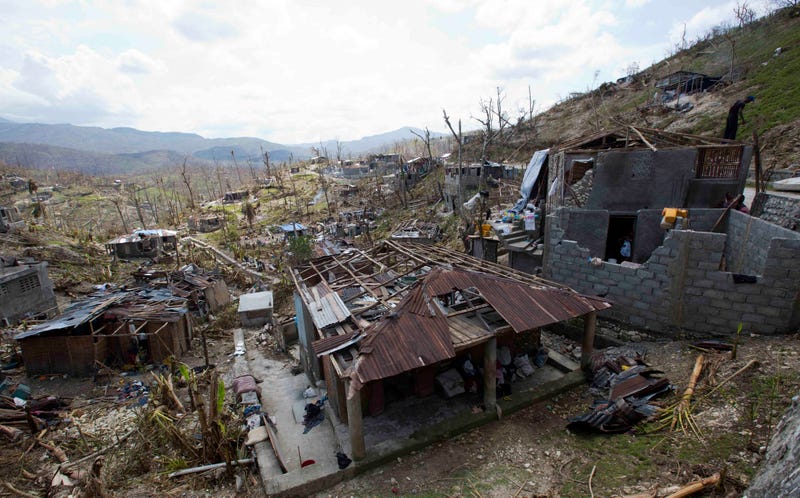Haiti Faces Nightmare Combination of Disease and Starvation After Hurricane Matthew
As Haiti reels from the immediate devastation of Hurricane Matthew, which plowed through the impoverished nation at Category 4 intensitylast week, aid groups fear that the worst is yet to come. According to experts on the ground, massive disease outbreaks and famine are in Haiti’s future.
The poorest nation in the Western Hemisphere, Haiti is predictably suffering the worst from the Hurricane Matthew, the record-breaking storm that brought fierce winds, torrential rainfall, and floods to the Caribbean and southeastern United States last week. Aerial footage has revealed widespread, catastrophic destruction in western Haiti, with some towns and villages “almost wiped off the map” according to UN Secretary General Ban Ki-Moon. More than a thousand Haitians are dead, and thousands more have lost their homes, livestock, and crops. The UN estimates that 1.4 million people are in need of immediate assistance.
One of the biggest threats facing Haiti right now is cholera, a waterborne illness that was, tragically, introduced to the country years ago by UN peacekeepers from Nepal. Since 2010, upwards of 10,000 Haitians including many young children have died from the disease, which causes uncontrollable vomiting and diarrhea, resulting in severe dehydration.
Haiti, a tropical island nation with practically no sanitation and where the average person can’t even afford fuel to boil water, is the ideal place for an illness like cholera to thrive. “It’s everywhere, unfortunately,”
said Bill Horan, president of the humanitarian aid group Operation Blessing, which is running a disaster relief effort out of Port Au Prince. “Most folks have outhouses or latrines out back, and when it rains a lot, these overflow, spreading potentially diseased human waste.”
said Bill Horan, president of the humanitarian aid group Operation Blessing, which is running a disaster relief effort out of Port Au Prince. “Most folks have outhouses or latrines out back, and when it rains a lot, these overflow, spreading potentially diseased human waste.”
Which is exactly what’s happening right now, following one of the most intense weeks of rainfall in Haiti’s history. There are no estimates yet of how many people have contracted cholera in the wake of Matthew, but between overflowing rivers and stagnant waters filled with animal and human corpses, the threat of disease grows with each passing day. To make matters worse, Horan says, much of the public health infrastructure in western Haiti was decimated by the storm.
Operation Blessing is right now focused on churning out and distributing as much chlorine as possible. “We have the capacity at our headquarters to produce 1,200 gallons of chlorine every 24 hours,” Horan said, adding that his group is also planning to fly community-scale chlorine makers to some of the hardest-hit areas. For anyone who lives in a region where there was flooding, the ability to disinfect water could be a life-saver.
According to Horan, pharmaceutical supplies are also trickling in to St. Boniface, a large hospital in western Haiti that will likely become “the nexus of public health care for the entire region for the next year.” But much more aid is needed, both here and in outlying communities that arereported to have no clean drinking water or antibiotics whatsoever.
As if the cholera crisis weren’t enough, thousands of Haitians also face the looming threat of starvation.
“Most Haitians depend on the crops and foods they can grow,” Horan said. “Every piece of food on every food tree is gone. The crops are just laying flat in the fields. Boats are smashed in fishing villages. And this stuff doesn’t just come back in a couple of months—it’ll be next year.”
Yesterday, Ki-moon made an emergency appeal of $120 million for food, shelter, and medical supplies to help Haiti pull through the next three months. “Tensions are already mounting as people await help,” the UN Secretary General said. “A massive response is required.”





Aucun commentaire:
Enregistrer un commentaire